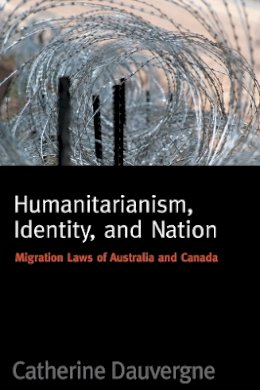
Humanitarianism, Identity, and Nation: Migration Laws in Canada and Australia
Catherine Dauvergne
Refugees are on the move around the globe. Prosperous nations are rapidly adjusting their laws to crack down on the so-called “undeserving.” Australia and Canada have each sought international reputations as humanitarian do-gooders, especially in the area of refugee admissions.
Humanitarianism, Identity, and Nation traces the connections between the nation-building tradition of immigration and the challenge of admitting people who do not reflect the national interest of the twenty-first century. Catherine Dauvergne argues that in the absence of the justice standard for admitting newcomers, liberal nations instead share a humanitarian consensus about letting in needy outsiders. This consensus constrains and shapes migration law and policy. In a detailed consideration of how refugees and others in need are admitted to Australia and Canada, she links humanitarianism and national identity to explain the current shape of the law.
If the problems of immigration policy were all about economics, future directions would be easy to map. If rights could trump sovereignty, refugee admission would be straightforward. But migration politics has never been simple. Humanitarianism, Identity, and Nation is a welcome antidote to economic critiques of immigration, and a thoughtful contribution to rights talk. It is a must-read for everyone interested in transforming migration laws to meet the needs of the twenty-first century.
Product Details
About Catherine Dauvergne
Reviews for Humanitarianism, Identity, and Nation: Migration Laws in Canada and Australia
Jonathan Klaaren, Professor of Law, The University of the Witwatersrand, Johannesburg
Law and Politics Book Review
The strength of Dauvergne’s book lies in its bold attempt to connect the identity construction of the nation/state to migration laws. In doing so, she shifts the discourse of migration laws from its economic framework to a humanitarian one. This book is written in a fluid and accessible style that most readers will appreciate. In conclusion, this is an insightful text that can be used effectively for teaching purposes at the senior undergraduate level in the disciplines of sociology, law, social work, and political science. This text is also an excellent resource for research projects in the area of human right and migration laws.
Parbattie Ramsarran, Department of Sociology, York University
Canadian Ethnic Studies, Vol. 37, No.2
